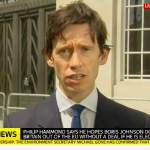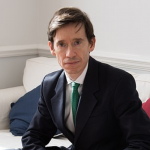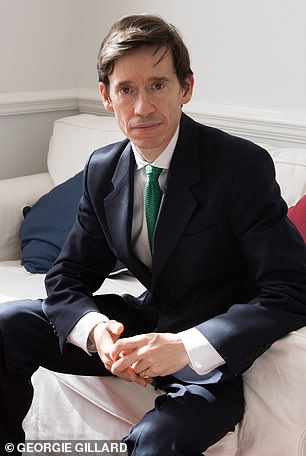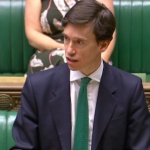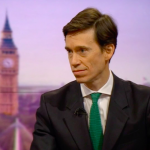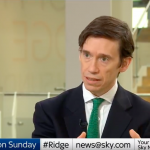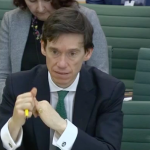‘I WILL PUT CUMBRIA BEFORE MY CABINET CAREER’
Article first published in the News & Star on 30 May 2019 by Emily Parsons.
Rory Stewart says he can solve the biggest threats to the county – by being elected Prime Minister.
Rory Stewart is one of 11 declared candidates in the running for the UK’s top role, and said he believes it is in the best interests for Cumbria for him to win the leadership race.
The Penrith and the Border MP said: “If I were lucky enough to be Prime Minister, I would be spending much more time in my constituency and have much more power to deal with the big issues which underlie the county and its stability.
“I would be able to have the resources to fly up to the new Carlisle airport, because I would want to be the type of Prime Minister that proved they are learning and listening to people. I would want to be spending very clearly time in the constituency to show I’m listening and talking to people.
“The connection between Prime Minister and constituency is vital: if you’re stuck in the Westminster bubble you don’t know what’s truly going on.
“The way to solve the biggest risks to Cumbria is by being Prime Minister.”
Mr Stewart made the comments as he outlined why he believes he should be in Number 10 – and why his rivals need to start recognising his threat.
“I believe that I can get Brexit done, beat Jeremy Corbyn and reunify the country,” he said.
One of 11 currently declared candidates for the UK’s top role – and the closing date not until the week starting June 10 – Mr Stewart was initially viewed as an outsider.
However, in the past week he has begun a Twitter campaign using the hashtag #Rorywalks, which has seen him head onto the streets of Britain armed with an iPhone to speak to the general public.
Mr Stewart explained: “The way I’ve changed this campaign is by getting out on the streets. Those other guys [Boris Johnson etc] are spending hundreds of thousands of pounds on their campaigns, and I’m getting 10 to 15 times the views and reach.
“People who would not traditionally vote Conservative are engaging with me, young voters are getting on side.
“I need other MPs to believe that I can win a General Election. They care about changing the country and to create the kind of Britain they believe in depends on being able to win an election.”
Of the rival candidates, the Secretary of State for International Development believes only two pose a real threat: Boris Johnson and Michael Gove.
“The real question is would you rather have me, Boris or Michael as Prime Minister?” Mr Stewart asked.
“If I had to guess, I would say the biggest competition in terms of reach and our style of Government and ability to get things done… I think Michael Gove is very effective.
“The question is, would he win an election in the way I can? I don’t know.
“Alternatively, you have Boris who is the only genuine celebrity in the race. I think that’s something that’s an asset but could also be a bit intrusive.
“He’s got huge supporters and is a great speaker, but there are some people who don’t think he’s quite right for Prime Minister.”
Mr Stewart is on the opposite side of the Brexit argument to Mr Johnson. The latter is arguing for a no deal Brexit, something the Cumbrian MP believes would be the worst possible outcome for his constituents – and for Cumbria as a whole.
“What we really do not need for farming is a no deal Brexit,” insisted Mr Stewart. “We need to be able to sell our sheep into the EU.”
It is this passion for farming that is among his reasons for being vocally opposed to Mr Johnson and his no deal Brexit pledge – a position he is determined to stand by.
“I’m very honoured to be in Government,” Mr Stewart admitted. “I love that job; it’s been one of the greatest privileges of my life, but I cannot continue to serve in the cabinet if I don’t agree with the policies I’m advocating for.
“I’d be happy to sacrifice my career in cabinet on a point of principle.”
Mr Stewart is instead proposing a completely alternative approach to resolving Brexit, taking inspiration from the Irish Citizens’ Jury which was held to discuss the potential change in abortion laws. This would involve 99 completely random UK residents being put in a room for three weeks to debate Brexit – and it would be televised.
“You find eventually they move on from ‘yes’ or ‘no’ to thinking about the issues beyond that,” the MP explained. “In Brexit you move on to saying do I want to sell cars into Europe? Do I want to protect agriculture in Cumbria?
“By getting through these issues, they come up with recommendations which can be taken back to Parliament. Then you have 40 to 50 Labour MPs on board who didn’t support it before, because you have a national consensus.
“I believe strongly that no deal is actually the slower route, and what people want is to get it done quickly. The faster route is to unstick Parliament, by taking three weeks out and going back to a Citizens’ Jury.”
Resolving Brexit, avoiding a snap General Election and unifying the nation again are key goals for Mr Stewart – and he believes he is the only man for the job.
“I’m very very worried that if we are not careful we are going to end up with a world in which unfortunately, we are split – the party and the country – and [the Conservatives] would lose an election and bring in Jeremy Corbyn.”
Mr Stewart continued: “Then there wouldn’t be very much for me to be Prime Minister of afterwards.
“When do you need a leader? We need a leader in a time of crisis. I need to step up in a time of crisis.
“I wouldn’t want to have a leader who thinks ‘this is a poison chalice, we’ll wait it out’. That would imply they are in it for the appearance, not for the job.”
Mr Stewart’s other pledges include doubling foreign aid spent on climate change, reorganising the intelligence services and getting superfast broadband in every home in the UK. “I know how to do it, but I need control of Treasury to do it,” he said.
He is gathering support from unlikely corners however, with author India Knight and footballer Gary Lineker tweeting their backing, while even Andy Wigmore, communications director for Leave.eu said Mr Stewart is “growing on him”.










